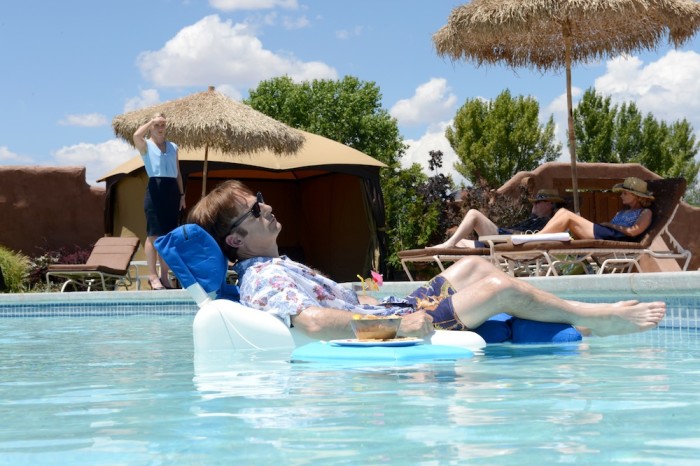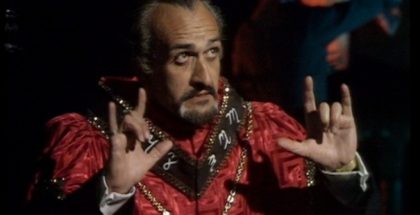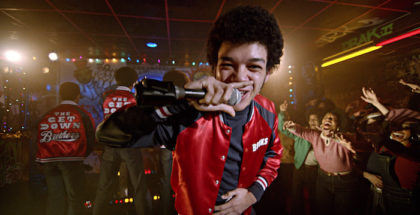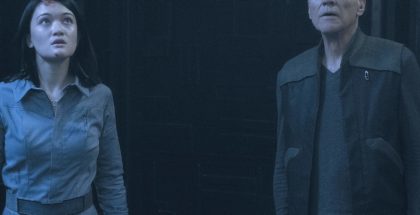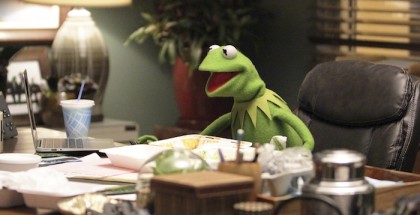Netflix UK TV review: Better Call Saul Season 2, Episode 7
Review Overview
Story
6Telling
8David Farnor | On 04, Apr 2016
Warning: This contains spoilers.
Let’s talk editing. It’s one of the most underrated parts of a TV show’s production, but if you ever want proof of why it shouldn’t be overlooked, watch this episode of Better Call Saul.
AMC’s Breaking Bad prequel has always excelled in the cutting room (Season 1 was nominated for two Emmys for outstanding single-camera picture editing for a drama) and Inflatable, Episode 7 of Season 2, is a prime example. We catch up with Jimmy McGill as he becomes increasingly disillusioned with working at Davis & Main, with their rules, procedures and law-abiding attitudes. That mismatch between Jimmy and his professional surroundings, though, is no surprise – we’ve been witnessing that for several weeks now, which leaves the scenario with little dramatic tension in the tank. Surely, it’s about time for the programme to move on? Jimmy, meanwhile, is facing his own obstacle: if he quits, he forfeits his signing bonus.
Halfway through the chapter, director Colin Bucksey comes up with an inspired solution for both: a montage of Jimmy being as annoying as possible to everyone in the office, until Cliff Davis (Ed Begley Jr.) gives in and fires him. Better Call Saul has already demonstrated its knack for editing together day-to-day routines for dramatic effect – Kim’s painstaking business development for HHM a few weeks ago was a masterclass in building up to a satisfying pay-off – but with the second season’s generally more serious tone, it’s less often that the series gets to show off its comic timing.
Assistant Editors Brock Hammitt and Curtis Thurber step up to the plate with relish, stitching together Jimmy’s assorted antics at one heck of a pace, pausing just enough to allow us to wonder what he’ll do next, as he surveys the instruments a music shop window, before accelerating with all the chaotic enthusiasm of a Wacky Waving Inflatable Arm-Flailing Tube Man – literally. Glancing at one on the way to work in his car, the erratic figure full of hot air becomes both visual inspiration for Jimmy and the show, with a split-screen of increasingly colourful wardrobe options unfolding rapidly, complete with a fun soundtrack.
It’s not a chance for the post-production team to cut loose, though, but also a key turning point in Jimmy’s transition to Saul. The breaking of his contract with D&M is visible from the switch of his outfits to the more familiar, garish suits Saul Goodman sports in Breaking Bad – a reminder of how superb Jennifer Bryan’s costume design is. (Compare Jimmy’s rainbow attire with Mike’s simple, often black, clothes.)
The editing also takes us back to Jimmy’s childhood in a flashback that sees Jimmy’s dad taken in by a con man, who enters his father’s shop and pretends to be a dad in an emergency. Jimmy’s dad falls for it, but Jimmy is wise to the game. “There are wolves and sheep in this world, kid. Figure out which you’re going to be,” the man tells young McGill. But we’re already getting hints of Jimmy’s slip into immoral territory: the boy hangs in the store room pretending to be sweeping, when he’s actually reading adult magazines, while he can not only spot a fellow lier, but also knows the word “grifting”.
“For what it’s worth, I think you’re a nice guy,” we see grown-up Jimmy say to Cliff in the present day – the kind of nice guy that his dad once was. In other words, a schmuck. A sheep.
“For what it’s worth,” retorts Cliff, who can see straight through Jimmy’s wolfish tricks, “I think you’re an asshole.”
It’s another important point for someone to make: Jimmy, while we sympathise with Bob Odenkirk’s hand-flapping, charismatic performance, is not a nice guy. He’s trying to be good, mostly thanks to Kim’s ever-discerning approval, which he craves, but he’s also willing to screw a company out of a $7,000 cocobolo desk, just because he thinks he deserves it.
Mike, on the other hand, continues to pursue something of a nobler cause – after being forced to back up Tuco’s account of events from last week, he first promises to buy his daugher a new house and second, begins to stake out Hector Salamanca’s restaurant. Will Mike be the one who puts him in the wheelchair? How far away are we from Gus entering the scene? And are Mike’s actions any better than Jimmy’s, giving both are operating in the shady area of the society?
It’s Kim who emerges as the one with the answer. Interviewing with Schweikart and Cokely after their job offer last week, she hints at where she came from before arriving in New Mexico – a mysterious back-story that could well prove important, but for now can be summed up in a single word. Why did she move? What did she want? “More,” comes the answer, and Rhea Seehorn’s steely resolve – and ambition – comes to the fore, not for the first time. That’s the same problem with Jimmy, who perpetually wants more than he has. (Mike, however, only wants more for his family; more safety from Hector and his gang.)
With Kim rejecting Jimmy’s offer of a partnership together, instead proposing a shared office with different companies, the question is presented, again, not of what they want, but how they intend to get it. Jimmy, with his coloured suits, has made his path clear, but Kim, who politely apologises for getting Schweikart’s name wrong post-interview, is looking for a more straight-laced career. The problem is that by now, as the show gets into its second half, we’ve already seen this question asked several times before. Just as we know that Mike and Jimmy will increasingly be brought together by Mike’s battle against Hector (Jimmy acts as Mike’s legal representative here), we know that Kim and Jimmy can’t really work as long-term associates.
But just as you start to sigh at the slight repetition, the episode ends halfway through a sentence. As Jimmy considers her proposal, the show cuts him off mid-pause – a novel way of displaying the same-old dilemma. The pacing and tension may not always be present, as Better Call Saul Season 2 gets into the business end of its story, but you can bet that the editing team will always find an interesting way of telling it. And that’s the mark of a good TV show.
Better Call Saul Season 2 is available on Netflix UK, as part of an £9.99 monthly subscription. New episodes arrive every Tuesday at 8.01am.
Photo: Ursula Coyote/Netflix


